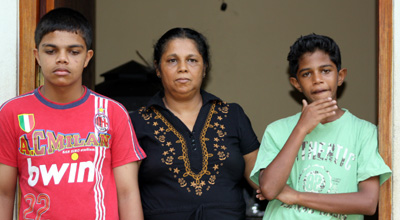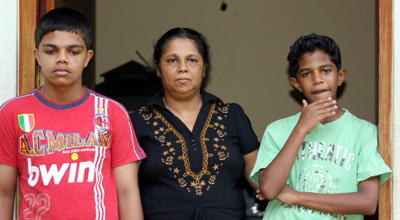Sri Lankan cartoonist and political reporter Prageeth Eknelygoda disappeared almost one year ago today. He was last seen leaving the Colombo offices of the political Website Lanka eNews, where he worked, late on the evening of Sunday, January 24, 2010. No one has heard from Eknelygoda since.
His wife, Sandhya, told CPJ that after her husband failed to come home that evening, she filed a police report. Eknelygoda’s editor, Sandaruwan Senadheera, told local and foreign media that he feared the cartoonist had been abducted in retaliation for his open support of the opposition during Sri Lanka’s 2010 presidential elections. The abduction theory resonates with Sandhya Eknelygoda, who said that in 2009 her husband was abducted, handcuffed, blindfolded, and held for one day by unidentified individuals. Days prior to Eknelygoda’s disappearance, Senadheera himself was forced to flee Sri Lanka fearing continuous threats against his life.
To this day, Eknelygoda’s 2009 abduction has not been investigated. But even worse is the fact that no government body has been able to give Sandhya Eknelygoda a clue about where her husband might be. She said she has been to Sri Lanka’s Human Rights Commission and received no answer. She has filed a case at the court of appeals, but the case has not gone to trial. She has petitioned the president, and has written time and again to other high ranking officials, but has received no information about her husband’s whereabouts or about the investigation into his disappearance. The government has made promises, yes, but a year later, nothing has come to light. And yet Sandhya Eknelygoda continues to fight for answers.

She is also fighting to support her two teenage sons, Sanjay and Harith. Both boys, she says, are struggling with the psychological consequences of their father’s disappearance. Moreover, with Sandhya as the household’s sole breadwinner, the family is struggling daily to make ends meet. Food and education expenses are particular concerns.
Sri Lankan colleagues and international organizations, including CPJ, have donated funds to help support Eknelygoda’s family. However, on the eve of the anniversary of the journalist’s disappearance, it is more clear than ever that the family will need long-term financial support while they struggle to find answers.
We are seeking donations to CPJ’s Journalists Assistance Fund, which will be used not only to support Sandhya Eknelygoda and her two children, but also other families of imprisoned and disappeared editors and reporters, as well as dozens of journalists around the world who are victims of violence and repression.
Here are two recent examples:
Families of the Maguindanao massacre
In November 2009, 32 journalists and media workers were executed in a politically motivated attack in Maguindanao province in the Philippines. The massacre–the single deadliest event for the press in CPJ history–left families devastated emotionally and financially. Working with local partners, CPJ provided grants to families such as that of Grace Morales to cover living expenses, school costs, and emergency medical care.
Families of journalists imprisoned during Cuba’s 2003 Black Spring crackdown
In March 2003, as the world watched the U.S.-led Iraq invasion, the Castro government cracked down on the island’s dissidents and independent press, throwing 29 reporters behind bars. With prison sentences of up to 26 years, the journalists were jailed in appalling conditions. José Luis García Paneque, for example, a surgeon-turned-editor of an independent news agency, spent more than seven years behind bars, where he was diagnosed with a kidney tumor, chronic malnutrition, and pneumonia. CPJ grants covered medicine and food that prison authorities would not provide to the ailing journalist. CPJ also paid travel expenses so his family could visit him in jail. García Paneque now lives in Spain.
All contributions to CPJ’s Journalist Assistance Fund will go directly to journalists in need. CPJ already covers the full cost of administering the Journalist Assistance program, including researching cases, delivering financial assistance, and providing non-financial support, including help with resettlement. What this means is that every dollar that you contribute–whether it’s $500, $100, or $10–will go directly to journalists in need or their families. And the entire amount is tax deductible. Please make a donation now to support CPJ’s vital wor
